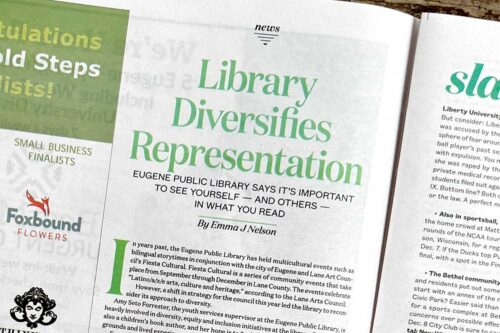
In years past, the Eugene Public Library has held multicultural events such as bilingual storytimes in conjunction with the city of Eugene and Lane Art Council’s Fiesta Cultural. Fiesta Cultural is a series of community events that take place from September through December in Lane County. The events celebrate “Latino/a/x/e arts, culture and heritage,” according to the Lane Arts Council.
However, a shift in strategy for the council this year led the library to reconsider its approach to diversity.
Amy Seto Forrester, the youth services supervisor at the Eugene Public Library, is heavily involved in diversity, equity and inclusion initiatives at the library. Forrester is also a children’s book author, and her hope is to “reflect the different abilities, backgrounds and lived experiences of the kids who are reading” her books, she says.
Forrester says that, rather than the library’s previous approach to representation, which included participation in local events or multicultural storytimes, the library now has a “day-to-day” mindset on diversity.
“We’re having those conversations of, who are we lifting up? Who could we? How could we shine a light on a creator who brings a lived experience that’s important? How do we connect with our community?” Forrester says.
There’s a reason why the city of Eugene includes libraries and cultural services in the same department. Public libraries offer people of all ages and cultural backgrounds an opportunity to explore their own, and each others’, lived experience.
Forrester cites the essay “Mirrors, Windows and Sliding Glass Doors” by Dr. Rudine Sims Bishop, a professor emerita of Ohio State University who researches American children’s literature, as one inspiration for her own books’ diverse representation.
“When there are enough books available that can act as both mirrors and windows for all our children, they will see that we can celebrate both our differences and our similarities, because together they are what make us all human,” Bishop writes.
According to the Oregon Department of Education’s At-A-Glance District Profile for the 2022-23 academic year, only 47 percent of students in Eugene School District 4J are reading at grade level. The numbers are even lower for students in marginalized communities, such as 38 percent of Black students, 30 percent of Hispanic/Latino students, 20 percent of homeless students and 24 percent of students with disabilities currently reading at grade level.
Forrester and the library want to use the mindset of mirrors, windows and sliding glass doors to support developing readers in their education.
“If kids see themselves reflected in books, their experiences, their identities, then they are more likely to see themselves as readers, and they’re more likely to be successful readers,” Forrester says.
“It’s not just about the Five F’s: food, festivals, fashion, famous people and flags. Those tend to be the ways that culture is sort of reduced or represented,” Forrester says. “They’re not the only things about culture that we should be looking at and celebrating and sharing with our community.”
Forrester’s staff of 15 is “wonderful, but they don’t represent every culture in the world or every lived experience,” she says. The library’s new approach to cultural representation hopes to elevate the voices of those who do have that lived experience.
“Rather than say, ‘Hey, what do you want?’ we just say, ‘Hey, you already have a thing that is successful, that is resonating with your community, that we are so happy to support,’” Forrester says.
“We want people to be welcomed,” Forrester says. “We want them to belong. We want this to be an equitable space for them to be in.”